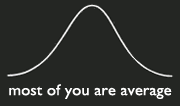 As long as we are on the topic of overcoming diversity and dealing with failure (see my recent post on Spanx and Failure), I thought I’d share a different angle that resonated strongly with me.
As long as we are on the topic of overcoming diversity and dealing with failure (see my recent post on Spanx and Failure), I thought I’d share a different angle that resonated strongly with me.
Leon Wieseltier, literary editor of The New Republic, finds himself deeply uncomfortable with the many claims heard by the successful (such as that of Oprah Winfrey in her recent address to the graduating class at Harvard) that “there is no such thing as failure.” The success stories put forth, he suggests, reflect not a triumph of inner resources, but yet another example of the “triumph of outer resources — a common confusion [among people] at the top.”
I share here a few paragraphs from Wieseltier’s article “Average is Not Over” (New Republic, 8.19.2013) in which he attacks the notion that failure is simply “a lucky break in life that is just moving us in another direction,” as Winfrey had suggested; he sees such perspective as a slander of sorts against the victims of hardship, as if they are entirely responsible for their fate.
* * *
Our lack of interest in unglamorous existence, which is to say, this collapse of sympathetic imagination, may be found in the contemporary maxim: “Average is over.” This notion, according to which we will either rise to the top or fall to the bottom, appears to have been coined by Thomas Friedman, and it originated in a worry about economic competitiveness.
Now Tyler Cowen is publishing a book called Average Is Over: Powering America Beyond the Age of the Great Stagnation, in which he declares that “average is over is the catchphrase of our age. … This maxim will apply to the quality of your job, to your earnings, to where you live, to your education and to the education of your children, and maybe even to your most intimate relationships. . . . They will either rise to the top in terms of quality or make do with unimpressive results.”
Cowen is concerned that we are not prepared for the new economy, which will require a high level of digital competence, and I am not here to gainsay his concern. I am here only to say that average will never be over. We will never be a nation of innovators and consultants. (Neither will China.) There will always be schoolteachers and nurses and shopkeepers and cooks and mechanics and custodians and the old-economy rest; there will always be people who do not write code (how else will the hapless codewriters get through life?); there will always be people who work for other people.
The sum total of all these people, and their skills and their labors, is called a society. A society is not an economy, and an economy is not an activity of futurist geniuses.
The ferocity about economic competitiveness, its promotion into a standard by which to measure things it cannot measure (“intimate relationships … to the top in terms of quality”), is resulting in a loss of respect for ordinary work and a soft contempt for ordinary people. What sort of imprecation, exactly, is “average”? Sometimes it sounds like the talk of a snob. Average, with respect to what? The cult of “achievement” has blinded many people to the diversity of the realms in which we may achieve.
Economic mediocrity is not human mediocrity. There are men and women whose “intimate relationships” are “to the top in terms of quality” who spend their days driving cabs and cleaning houses. The streets are crowded with lovers; there are thinkers on the subways.
The other day I found this in the galleys of a gorgeous “prayer journal” by Flannery O’Connor, from 1947: “Can we ever settle on calling ourselves mediocre — me on myself? If I am not this or that that someone else is, may I not be something else that I am that I cannot yet see fully or describe? … Maybe I’m mediocre. I’d rather be less. I’d rather be nothing. An imbecile. Yet this is wrong. Mediocrity, if that is my scourge, is something I’ll have to submit to.”
What humility, what lack of utility.